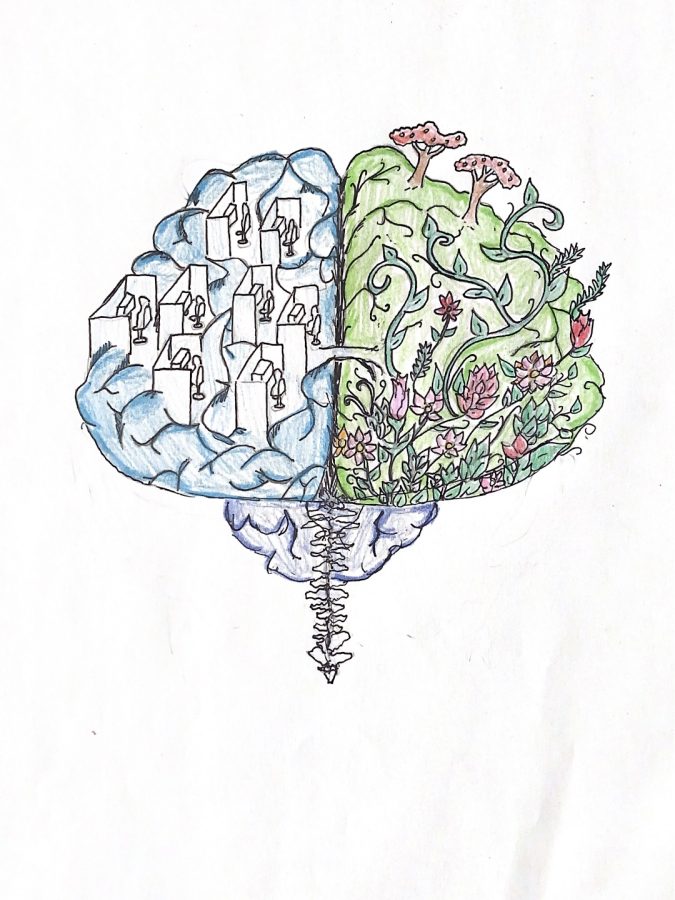Pitfalls of Perception
Why our brains are so quick to ignore climate change
“Scientific data, although undoubtedly vital for alerting our rational brain of the existence of a threat, does not galvanize our emotional brain into action,” George Marshall, founder of the Climate Reach and Information Network, wrote in his book, Don’t Even Think About It.
“2021 is a make-or-break year for climate action,” wrote the World Meteorological Organization in June. “The window to prevent the worst impacts of climate change—which include ever more frequent more intense droughts, floods, and storms—is closing rapidly.” In September, editors from over 200 health journals published a joint editorial stating, “The science is unequivocal; a global increase of 1.5°C above the pre-industrial average and the continued loss of biodiversity risk catastrophic harm to health that will be impossible to reverse.” We know how bad it is. Yet when scientists lay out the evidence, the intensity of the message seems to paralyze us. What goes on in the human brain that makes it so difficult for us to act against climate change?
“I think so many people find it difficult because the problem is not on our doorstep just yet,” explained leader of the Go Green Club, Sarah Kaplan (‘23). “It’s hard to wrap our heads around something so complex and distant. I think psychologically, it’s easier for people to exist in their daily lives by ignoring the issue completely.”
Abby Lin (‘23), a member of the Go Green Club, expressed a similar outlook. “Climate change seems like such an abstract issue that doesn’t affect our present,” she said. “It’s hard to get people to care especially when human action is largely reward-driven.” What Sarah and Abby both touch upon here is the psychology behind climate change denial, a very real phenomenon.
Hidden Brain’s Shankar Vedantam discussed this concept further in a podcast titled, Why Our Brains Weren’t Made to Deal with Climate Change. While visiting the Mendenhall Glacier in Alaska—which has retreated over one and a half miles in the last half-century—Vedantam interviewed John Neary, a forest service official at the reserve where the glacier is located.
“I think that for too many people, the issue [climate change] is some Micronesian island that’s having an extra inch of water this year on their shorelines or it’s some polar bears far up in the Arctic that they’re really not connected with,” he said. “But when they [visitors] realize, they come here and they’re on this nice day like we’re experiencing right now with the warm sun and they start to think about this glacier melting and why it’s receding, why it’s disappearing, why it doesn’t look like that photo just 30 years ago up in the visitor’s center, it becomes real for them, and they have to start grapple with the issues behind it.”
As Sarah and Abby noted, there’s a neglect to grasp the reality of climate change because it feels so distant from us. If we cannot tangibly understand its effects in a way that is personal and meaningful to our lives, why should we care? George Marshall, environmentalist and founder of Climate Outreach calls this, “the tragedy of the commons.”
“The tragedy of the commons is an idea that every individual has an incentive to do something if it’s in their own self-interest, even if it harms the overall population,” explained History and Social Science Chair Ms. Karri Woods. “Someone thinks, ‘if you aren’t going to do it, why should I?’ And that inaction leads to worse outcomes for everyone.” The tendency to fall into these patterns of thinking poses a real challenge to combating climate change as a society. “Dealing with climate change requires vast levels of coordination,” Ms. Woods continued. “It requires the individual to make decisions that are more sustainable which can be less comfortable—more expensive, more annoying. You also have to rely on billions of other people to make similar choices. When you see people not complying with a particular cultural norm, like trying to be more sustainable, it becomes harder to stay motivated. You think, ‘Why do I have to do this if others won’t?’”
However, people aren’t solely motivated by their own personal interests. It’s human nature to crave a sense of belonging—to share a common identity and be a part of something larger. This need to belong is why many of us orient ourselves politically and cling so strongly to hierarchical structures. Interestingly, there is a correlation between the acceptance of hierarchical power structures and climate change denial.
Kirsti Jylhä, a psychologist at Uppsala University, found that people who are more accepting of hierarchical structures are, in turn, more accepting of human dominance over nature. As a result, people are less willing to sacrifice conveniences that are seemingly essential to their daily lives, especially when those sacrifices fail to yield an instantaneous personal reward. “In psychology, there are target questions and heuristic questions.” Ms. Woods elaborated.
“Target questions often require a more difficult and complex response, so we automatically devise simpler heuristic questions that are easier to answer but don’t actually address the complexities of the target question. Instead of saying, ‘What steps could humans take to combat climate change?’ We ask, ‘What policies does my political party advocate for?” Because climate change is such an abstract concept with so many discrepancies, such as the degree to which it can be managed or stopped, debates surrounding the issue often become greatly politicized. It’s much easier for us to fall in line with our political constituencies rather than deviate from the cultural norm and seek information for ourselves. This lack of base knowledge poses another challenge.
“Many people are also skeptical about climate change because they can’t differentiate between daily weather and rising global temperatures,” Sarah continued. “Just because there is a super cold day in the summer does not mean the global temperatures aren’t rising and climate change is fake. I do believe that people being skeptical or even in denial about climate change is a major issue because education and awareness is the first step to substantial change.” Education informs the basis of how we view and process information. But how can we educate others when it feels like no one is listening?
Sarah looks to youth climate change activist Greta Thunberg as a beacon of hope. “I really do respect climate change activists such as Greta Thunberg,” she said. “From my experience trying to have administrators make climate-conscious decisions on campus, I can only imagine what it must be like to stand up to global leaders and big corporations as a sixteen-year-old. It’s so important to speak loudly and boldly because if we don’t, our case for climate change would just get washed over. Activism is a super important way to demand change.”
Another salient factor that diminishes our desire to fight climate change is the perceived insignificance of our actions stacked against those of corporations. “In order to curb emissions, corporations would have to make major, and likely costly, changes to how they do business,” Ms. Woods pointed out. “As an individual, it feels like I’m doing very little. Many feel that they don’t have enough agency to make a huge difference.”
But any action is better than none at all. “Our actions and choices do matter,” stated Abby. “Widespread change begins with individual action.” Instead of treating the issue as a far-off abstraction to be dealt with in the future, we need to look at climate change more holistically—as a real human problem unfolding every day, not a shapeless sociopolitical dispute. Sarah summarized it best: “Human problems can be fixed, if only we change the way we think about them.”

Tate Vaccaro joined The Tower staff in 2019 as a sophomore in hopes of bettering her writing skills and learning more about the Bishop’s Community. She...







